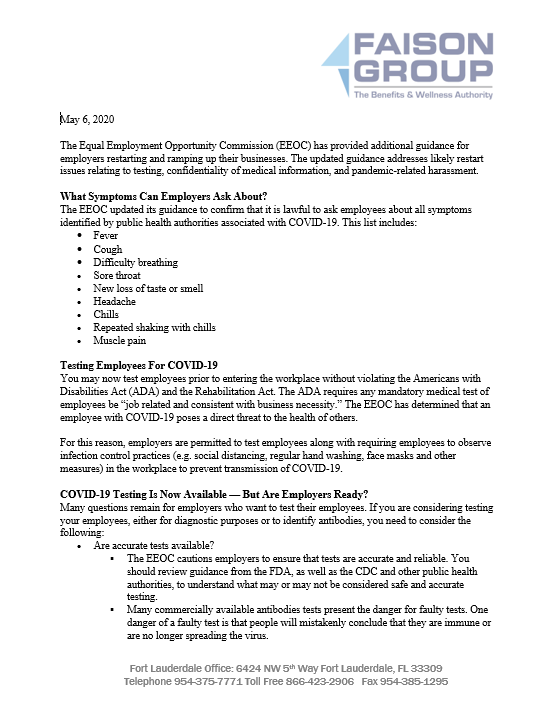EEOC COVID-19 Update

Written by Ellyn Frankel
May 6, 2020
The Equal Employment Opportunity Commission (EEOC) has provided additional guidance for employers restarting and ramping up their businesses. The updated guidance addresses likely restart issues relating to testing, confidentiality of medical information, and pandemic-related harassment.
What Symptoms Can Employers Ask About?
The EEOC updated its guidance to confirm that it is lawful to ask employees about all symptoms identified by public health authorities associated with COVID-19. This list includes:
• Fever
• Cough
• Difficulty breathing
• Sore throat
• New loss of taste or smell
• Headache
• Chills
• Repeated shaking with chills
• Muscle pain
Testing Employees For COVID-19
You may now test employees prior to entering the workplace without violating the Americans with Disabilities Act (ADA) and the Rehabilitation Act. The ADA requires any mandatory medical test of employees be “job related and consistent with business necessity.” The EEOC has determined that an employee with COVID-19 poses a direct threat to the health of others.
For this reason, employers are permitted to test employees along with requiring employees to observe infection control practices (e.g. social distancing, regular hand washing, face masks and other measures) in the workplace to prevent transmission of COVID-19.
COVID-19 Testing Is Now Available — But Are Employers Ready?
Many questions remain for employers who want to test their employees. If you are considering testing your employees, either for diagnostic purposes or to identify antibodies, you need to consider the following:
- Are accurate tests available?
- The EEOC cautions employers to ensure that tests are accurate and reliable. You should review guidance from the FDA, as well as the CDC and other public health authorities, to understand what may or may not be considered safe and accurate testing.
- Many commercially available antibodies tests present the danger for faulty tests. One danger of a faulty test is that people will mistakenly conclude that they are immune or are no longer spreading the virus.
- The EEOC states: “Employers may wish to consider the incidence of false-positives of false-negatives associated with a particular test. Finally, note that accurate testing
only reveals if the virus currently present; a negative test does not mean the employee will not acquire the virus later.”
- Who is going to test your employees?
- Ideally, a nurse or medical professional will conduct testing.
- If you choose to administer tests yourself, whoever tests employees will need proper personal protective equipment, training on using personal protective equipment, and training on blood borne pathogens if there will be possible exposure to bodily fluids.
- Are there any certification or waiver requirements?
- Depending on the type of test used, there may be requirements that the test only be performed by properly certified laboratories. Likewise, while there may be circumstances in which the requirement to use a certified laboratory can be excused, this could necessitate obtaining an appropriate waiver or other prior approval.
If testing is not a feasible option for your business, you may still take the other measures identified by the EEOC to ensure a safe workplace:
• Ask employees if they are experiencing symptoms of COVID-19;
• Measure employees’ body temperature; and
• Tell employees who become ill with symptoms of COVID-19 to stay home or leave work.
Confidentiality Of Medical Information
While you are now permitted to ask employees about all symptoms of COVID-19 identified by the CDC, measure their temperatures, and test employees for COVID-19, you must comply with ADA confidentiality requirements. The ADA requires you to store employee medical information separately from employee personnel files. You may store COVID-19 related medical information in existing medical files. Additionally, you may share the names of employees with a public health agency when they learn the employee has COVID-19.
Pandemic-Related Harassment
The EEOC reminds employers that it is against federal EEO laws to harass or otherwise discriminate against coworkers based on race, national origin, color, sex, religion, age (40 or over), disability, or genetic information. You should immediately review any allegations of harassment or discrimination and take appropriate action.
